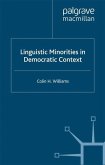This blends discussion of the role of language minorities in politics with examples of language policy in a range of national contexts. It discusses minority rights and language protection, the policies of the state in privileging powerful majorities, the opportunities and challenges of both devolution and globalization.
'Linguistic Minorities in Democratic Context will undoubtedly quickly become a classic in language policy literature. It presents a finely-balanced account of principles in language management, and shows how these have worked out in the major cases of the Celtic languages, the Spanish autonomous regions, and Canada. The wealth of detail of legislative and bureaucratic activities balances the sensitive analysis of competing theories, and supports Williams' argument for a holistic approach to understanding sociolinguistic ecology.' Bernard Spolsky, Bar-Ilan University, Israel
'Colin Williams' book is an impressive treatment of the question of language and nation, the product of thorough scholarship and thought. Its interdisciplinary coverage encompasses linguistics, geography, political theory and institutional design. It will be an important reference point for debates about small nations and cultures in a globalizing world.' - Michael Keating, Professor of Regional Studies, European University Institute, Florence, Italy
'Colin Williams' book is an impressive treatment of the question of language and nation, the product of thorough scholarship and thought. Its interdisciplinary coverage encompasses linguistics, geography, political theory and institutional design. It will be an important reference point for debates about small nations and cultures in a globalizing world.' - Michael Keating, Professor of Regional Studies, European University Institute, Florence, Italy








